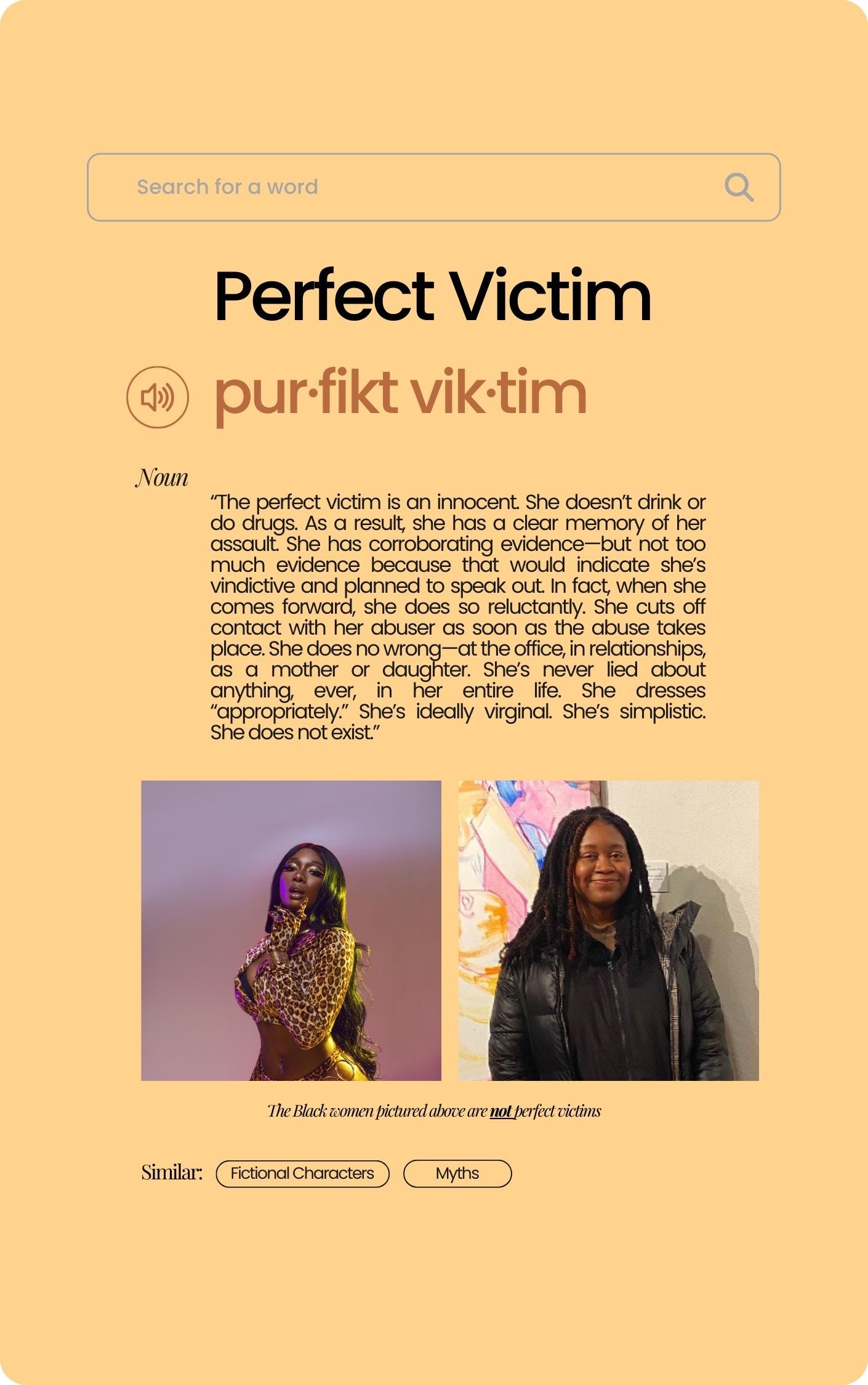Perfect Victim [noun, pur∙fikt vik∙tim]- “The perfect victim is an innocent. She doesn’t drink or do drugs. As a result, she has a clear memory of her assault. She has corroborating evidence—but not too much evidence because that would indicate she’s vindictive and planned to speak out. In fact, when she comes forward, she does so reluctantly. She cuts off contact with her abuser as soon as the abuse takes place. She does no wrong—at the office, in relationships, as a mother or daughter. She’s never lied about anything, ever, in her entire life. She dresses “appropriately.” She’s ideally virginal. She’s simplistic. She does not exist.”
On the evening of December 23, 2022, I was celebrating my 27th birthday with friends. Impulsively, I unlocked my phone screen to a friend’s text. Immediately, the surrounding sounds dulled, and my eyes unfocused.
Unblinking, I could not type the words into the phone in my hands.
Eyes unmoved, I asked, “Can someone please check the news? I think the verdict is out,” My heart pounded in my ears until I heard reassurance.
“Earlier today, they found Torey Lanez guilty.” I shut my eyes and breathed out.
The first time I heard Megan Thee Stallion’s confident and energetic music, I could not get enough. Her tone and flow, paired with slick and sexy beats, infected me with her sultry swagger and self-confidence. It seemed like the world was singing and dancing to her songs like Cash Shit with DaBaby.
And then someone shot Megan Pete on July 12, 2020.
Around the time that I escaped an abusive relationship involving intimate partner violence, court proceedings began for the State’s trial against Daystar Peterson.
For the past year, the parallels have shocked and startled me. Truthfully, it’s been triggering seeing the masses comment on a situation too similar to mine. People close to Megan began taking her abuser’s side. They attacked her for everything. To defend herself and her reputation, Megan spoke about her truth with Gayle King. Still, her abuser continually threw wrenches into her story, even going as far as paying off her former best friend to turn against her.
The taunting continued via celebrities like LeBron James, Drake, and DaBaby who publicly showed their support for Tory Lanez in the months before the trial began. They made every excuse for the shooting, including Megan’s dishonesty.
Similarly, I’ve heard every excuse for why my abuser couldn’t have abused me. He had a rough childhood, his family abandoned him, and his boss hated him. Everyone in his life betrayed him. He couldn’t cause the harm he did. Outside the home, he made it all seem perfect. He wore the mask well.
So without naming my abuser, I wrote a post about how he threatened me into silence throughout our relationship. I received hateful backlash about speaking my truth. No one wanted to believe that my abuser — a relatively popular and charming “community-focused small business owner”- could be who I said he was. I couldn’t be who I said I was either.
My story is, unfortunately, not unique. As a Black woman, I am subject to the same mistreatment and lack of justice that even celebrities like Megan Thee Stallion experience. We live in a society that shames and belittles abuse victims and their efforts to speak up. We are too imperfect, outspoken, sexual, emotional, or too anything else to be “good” victims. Perfection is the expectation of receiving understanding. Yet it is suspicious if we are “too perfect.”
The answer, of course, is that no woman is ever perfect enough to be beaten.
Believing in an abuser's capacity to change how they navigate relationships is a genuine sentiment. Unfortunately, many times, the perpetrator does not want to change. And yet, as a society, we love a redemption story more than we love victims. We love the rehabilitation of abusers more than we care for the harm that the victims have endured at that abuser’s hands.
In this world, there is less hope for those who experience abuse than those who perpetrate abuse.
In 2016, I developed a thesis, “You Know You That Bitch When You Cause All This Conversation: Contemporary Artists’ Subversion of Stereotypes of Black Women’s Sexuality,” which explored the history of Black female sexuality. Research confirmed that old-fashioned ideas of a “hyper-sexual Black woman” remain in contemporary popular culture. And through it all, Black women continue to reconstruct and reclaim ownership of their sexuality through their erotic power.
However, unapologetic existence is not enough. Calculated misogynoir rules social perception and treats victims as inconveniences.
This is why the “perfect victim” myth is so pervasive and damaging, especially to Black Women. Our society must break this cycle for victims to receive the justice and healing they deserve. We must recognize the power of victim-blaming and how it silences and harms survivors. We must create a society where victims feel safe to speak out and receive justice, healing, and understanding in return.





Dear Rochelle, I am so sorry for what you went through. I agree with you and am ashamed to admit that I have fallen for the redemption story ...imperfect victim ...bs.